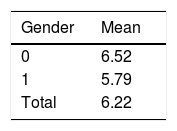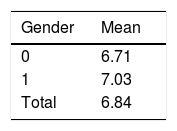To analyse the relationship between the level of adherence to the Mediterranean diet and the control of cardiovascular risk factors.
MethodA descriptive, observational study was conducted on patients diagnosed with Diabetes Mellitus type 2, with poor blood glucose control and a Body Mass Index greater than 25kg/m2. The relationship between the adherence to the Mediterranean diet and cardiovascular risk factors was evaluated before and after education about the Mediterranean diet. The patients were given a questionnaire on the level of adherence to the Mediterranean diet (the Mediterranean diet score), at the beginning of the study and at 6 month after having education about the Mediterranean diet in the Primary Care medical and nursing clinics. An analysis was carried out on the variables including, gender, age, weight, height, and Body Mass Index, as well as the analytical parameters of blood glucose, glycosylated haemoglobin, total, HDL, LDL cholesterol, and triglycerides. The relationship between the primary variable, ‘adherence to the Mediterranean diet’, and the rest of the variables was calculated before and after the educational intervention.
ResultsThe initial ‘adherence to the Mediterranean diet score’ in the questionnaire was relatively low (6.22). Excess weight, as well as to have an elevated Body Mass Index are associated with a lower adherence to the Mediterranean diet, as well as low adherence to treatment (p<.00 and p<.02, respectively). The values of HDL cholesterol values increased with greater adherence (p<.04). Elevated LDL and total cholesterol are associated with a lower adherence to the Mediterranean diet (p<.01 and p<.05, respectively), similar to that of elevated triglycerides (p<.00). Elevated baseline blood glucose levels are also associated with low adherence to the Mediterranean diet (p<.04), as well as the increase in glycosylated haemoglobin (p<.06).
Thus the cardiovascular risk increases with low adherence (p<.08).
After the educational intervention, a moderate increase was observed in the adherence to the Mediterranean diet (a score of 6.84) as well as a notable improvement in the control of the cardiovascular risk factors.
ConclusionsAdherence to the Mediterranean diet is associated with improved control of cardiovascular risk factors.
Analizar la relación entre el grado de adherencia a la dieta mediterránea y el control de los factores de riesgo cardiovascular.
MétodoEstudio observacional descriptivo en pacientes diagnosticados de diabetes mellitus tipo 2 con mal control glucémico e índice de masa corporal superior a 25kg/m2, en el cual se evalúa la relación entre la adherencia a la dieta mediterránea y factores de riesgo cardiovascular, antes y después de una educación sobre dieta mediterránea. Se les administra una encuesta de grado de adherencia a la dieta mediterránea, «score de dieta mediterránea», al inicio del estudio y a los 6 meses, tras realizar una educación sobre dieta mediterránea en las consultas médicas y de enfermería de Atención Primaria. Se analizan las variables edad, sexo, peso, talla e índice de masa corporal, así como los parámetros analíticos de glucemia, hemoglobina glucosilada, colesterol total, cHDL, cLDL, triglicéridos. Se relaciona la variable principal «adherencia a la dieta mediterránea» con el resto de las variables, antes y después de la denominada intervención educativa.
ResultadosInicialmente la puntuación de la encuesta de adherencia a la dieta mediterránea fue relativamente baja (6,22). Tanto el exceso de peso como tener un índice de masa corporal elevado están en relación con una baja adherencia a la dieta mediterránea, así como con una baja adherencia terapéutica (p<0,00 y p<0,02, respectivamente); los valores de cHDL aumentan con una mayor adherencia (p<0,04); los valores de cLDL y colesterol total elevados están relacionados con una menor adherencia a la dieta mediterránea (p<0,01 y p<0,05, respectivamente), al igual que los triglicéridos elevados (p<0,00). Las cifras elevadas de glucemia basal también están relacionadas con la baja adherencia a la dieta mediterránea (p<0,04), así como el incremento de la hemoglobina glucosilada (p<0,06).
Por tanto, el riesgo cardiovascular aumenta con la baja adherencia (p<0,08).
Tras la intervención educacional observamos un aumento moderado de la cumplimentación de la dieta mediterránea (puntuación de 6,84) y una notable mejoría en el control de los factores de riesgo cardiovascular.
ConclusionesLa adherencia a la dieta mediterránea está en relación con el mejor control de los factores de riesgo cardiovascular.









